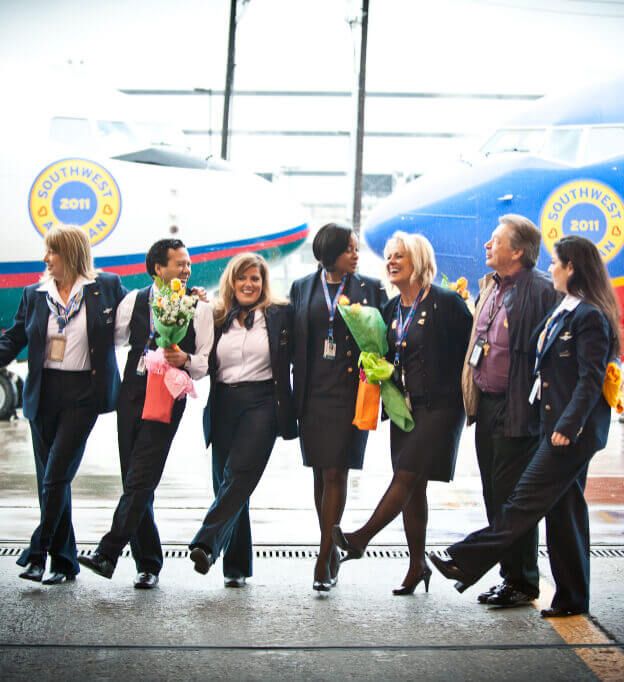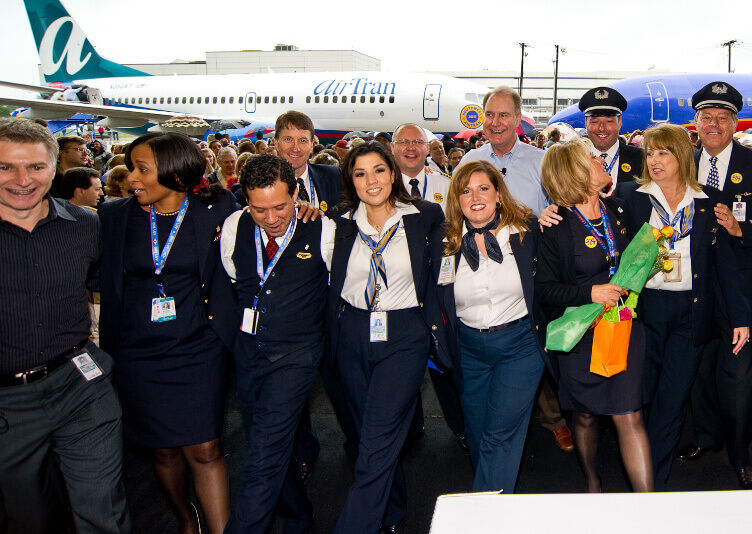
Employees link arms to celebrate the blending of the AirTran and Southwest Families.
Changes in the Air: Atlanta Calling
The Great Recession of 2008-09 posed a grave threat to an already slow period of growth for Southwest Airlines. To Chairman and CEO Gary Kelly, who was also President at the time, 2009 “looked like it was destined to be a losing year” with low demand and the possibility of layoffs. “It was really looking bad,” he admitted.
Southwest needed a way to pivot out of the gloom and jumpstart growth. Specifically, Gary was looking to make investments to put the Company in a position to move into longer-haul markets after the downturn. The problem was, he said, “we just didn’t have many opportunities.”
With Southwest shrewdness, the Company kept its eyes open and its cards close to the chest. Outside Gary’s office, nobody knew about a shift in Southwest’s strategy or exploring new frontiers such as the Southeast.
At the time, James Ashworth was working for AirTran at its call center in Atlanta. He grew up in the Atlanta area and understood his Customers and how the airline connected with their work and lives. James had jet fuel in his veins since his father had worked for Eastern Airlines. As a kid, James had helped his father prepare for his qualifying exam to work the ramp in Atlanta.
“The first test that he had was a city code test, and I helped him.” He quizzed him with flash cards, and his father passed the test.
James got his own start in the airline industry with ValuJet in 1994. He knew of Southwest mainly as an upstart out of Dallas that ValuJet respected. As James said, “We were a startup carrier, and we were trying to follow a very similar business model because it seemed to be working out in the Midwest.”
In 2010, James was leading AirTran’s Atlanta call center. On September 27 of that year, Southwest announced its agreement to acquire AirTran. It took James totally by surprise.
“It was an interesting day,” he recalled. “I got a call from my Leader at the time asking me to be in the office early Monday morning for a very serious announcement, and I had no idea what it was.” James thought it might be about negotiations over pilots’ contracts.
When he got to the center Monday, the news hit the room like a bombshell. “I tell you it was a surprise.”
He stepped out for a minute to call his wife. “Something just happened today, and I don’t know what it means for us,” he told her. “But I’ll call you back or talk to you later about it tonight when we get home.” Meanwhile he wondered: What does this mean for the Employees? What changes for us, and what’s coming down the pike?
In the months leading up to the announcement, internal communications had used code to maintain tight secrecy. In documents and on conference calls between Atlanta and Dallas, Southwest was referred to as “Cowboy” and AirTran as “Falcon” to keep the deal under wraps.

Bob Jordan (left) and Gary Kelly (middle) celebrate the union of AirTran and Southwest with Employees from both Companies.
Gary could hardly believe the confidentiality effort succeeded: “That was about a six-month effort. And the fact that we were able to keep that a secret was absolutely astounding. But yeah, we surprised the world,” he beamed.
Now Southwest’s Vice President Customer Support & Services, James agrees. “I think not only was it a surprise to the Employees, I think it was also a surprise to the competition. And I think it caught the competition off guard in a good way.”
The AirTran deal closed on May 2, 2011. The acquisition brought Southwest a 25 percent increase in capacity, another 8,000 Employees, 139 airplanes (including 87 Boeing 717s that continued to fly under the AirTran brand until 2014 before being leased to other operators), and, significantly, 19 new destinations.
The expansion “was something we were really excited about,” Gary says. It added Atlanta to the route map, and reached up the East Coast to Washington, D.C., (Reagan National) and New York (LaGuardia). Southwest restructured the AirTran routes and business, boosted profitability and growth, and as Gary says, “It’s just been a fabulous acquisition.” Acquiring AirTran “allowed us to really get on a growth path.”
